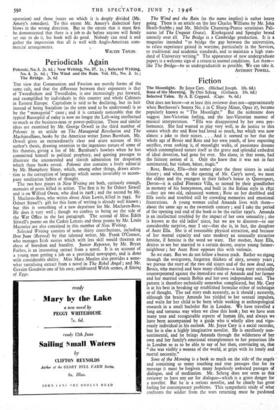Periodicals Again
Polemic, No.3. 2s. 6d.; New Writing, No. 27. ls.; Selected Writing, No. 4. 2s. 6d.; • The Wind and the Rain. Vol. III., No. 2. Is.; The Bridge. 2s. 6d.
THE view that Communism and Fascism-are merely forms of the same cult, and that the difference between their exponents is that of Tweedledum and Tweedledee, is one increasingly put forward, and exemplified by individuals in this country and whole Cabinets in Eastern Europe. Capitalism is said to be declining, but its heir instead of being Socialism (as the term used to be understood) is to be the " managerial " caste ; and it is certainly noticeable that the typical Russophil of today is now no longer the Left-wing intellectual so much as the business-man or power-politician. These and similar ideas are examined by Mr. George Orwell in the third number of Polemic in an article on The Managerial Revolution and The Machiavellians, books by the American writer James Burnham. Mr. Orwell gives an extraordinarily clear and acute account of this author's thesis, drawing attention to the ingenious nature of some of his theories, giving a list of Mr. Burnham's howlers when he has committed himself to political prophecy, and quoting passages to illustrate the unconcealed and slavish admiration for despotism which these books reveal. Polemic also contains a lively editorial by Mr. Humphrey Slater, which, among other things, draws atten- tion to the corruption of language which seems invariably to accom- pany totalitarian habits of thought. The two best pieces in New Writing are both, curiously enough, memoirs of poets killed in action. The first is by Sir Osbert Sitwell and is on Wilfred Owen, who died in 1918 • and the second by Mr. J. Maclaren-Ross, who writes about Alun Lewis, killed in 1943. Sir Osbert Sitwell's gift for this form of writing is already well known ; but this is something of a new departure for Mr. Maclaren-Ross. He does it very well ; though we confess to being on the side of the War Office in the last paragraph. The second of Miss Edith Sitwell's poems on the Casket Letters and three poems by Mr. Louis Macneice are also contained in this number of New Writing.
Selected Writing consists of some thirty contributions, including Don Juan (Retired) by that talented writer, Mr. Frank O'Connor, who manages Irish stories which with less skill would threaten an abyss of boredom and banality. Junior Reporter, by Mr. Bryan Forbes, is an interesting extract from a novel. It is an account of a young man getting a job on a provincial newspaper, and is done with considerable ability. Miss Mara Meulen also provides a some- what tantalising extract from a novel in-The Rebel Angel ; and Mr. Geraint Goodwin one of his easy, unlaboured Welsh scenes, A Sitting of Eggs. The Wind and the Rain (as the name implies) is rather heavy going. There is an article on the late Charles Williams by Mr. John Heath-Stubbs ; and Mr. Melville Channing-Pearce scrutinises Pali- nurus (of The Unquiet Grave). Kierkegaard and Spengler brood uneasily over all. The Bridge is a Cambridge production. It is a magazine intended " to bridge the gap between the universities, to relate experience gained in wartime, particularly in the Services, to traditional and academic standards, and to maintain a high stan- dard of University 'writing." The appearance of new undergraduate papers is a welcome sign of a return to normal conditions. Let them— like The Bridge—be as undergraduatish as possible. We can take it.
ANTHONY POWELL.


























 Previous page
Previous page